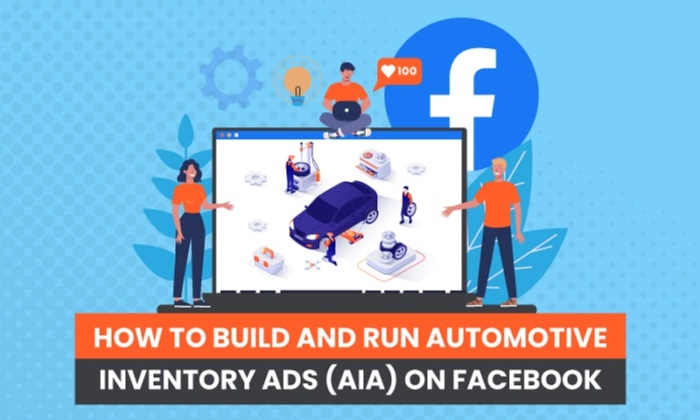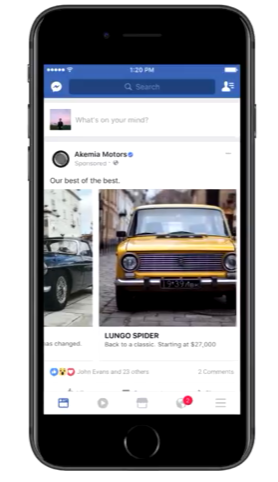
Quick question: what do you think holds back the average auto dealership from increasing sales?
Put simply: Friction is a sales killer.
Friction prevents a customer from moving to the next stage in the sales cycle. These friction points can be anything from a slow website to an unexpected cost.
You’ll never be able to eliminate some friction points, of course—for instance, not everyone who views an ad needs or can afford a car. However, fortunately, there are plenty of friction points dealerships can address before a customer ever steps on the lot.
Fortunately, when you want to market vehicles on social media, dynamic Automotive Inventory Ads (AIAs) can reduce friction dramatically.
Today, we will discuss what makes the Automotive Inventory Ad such a powerful dealership marketing tool and how you can implement one properly.

What Are Automotive Inventory Ads (AIAs)?
Essentially, Automotive Inventory Ads leverage user engagement and show ads to in-market shoppers. Through integration, shoppers are presented with vehicles relevant to their interests, allowing your sales team to focus on converting quickly.
The key difference between AIAs and typical Facebook dynamic ads is that AIAs focus on car sales alone.
For instance, AIA supports retargeting for both new and used car inventory. Facebook also allows you to focus on people already shopping for cars, ensuring viewers are more likely to convert.
Further, AIAs don’t just look for car shoppers—they can look for choosy car shoppers. Make, model, and trim are all accounted for, matching ideal vehicles to interested shoppers. Plus, you can include location details, so you only focus on nearby buyers.
In essence, AIA usage is a no-brainer for dealerships looking to get ahead of the competition.
Why Should You Run an AIA on Facebook?
One of the biggest reasons to switch over to AIA is the ease of use.
Automotive inventory ads function automatically once you’ve set them up. You only need to set up your campaign once to promote your entire automotive inventory. That’s right; you won’t need to sit around creating individual ads.
Your campaigns are permanently activated and can automatically reach shoppers with the right vehicle at the right time, whether on mobile or desktop.
Best Practices for Automotive Inventory Ads on Facebook
Facebook designed AIA as a simple way for dealerships to elevate their automotive marketing. In fact, don’t be surprised if your competitors start implementing them soon!
When it comes to Facebook’s AIA setup, here are a few steps your team can take to stand out from the crowd.
1. Optimize Images
Make sure your visuals are eye-catching and high-quality to entice viewers to click.
Choosing a great camera, effective lighting, and neutral backgrounds are just a few best practices.

In addition to photo composition, be sure to set your vehicle photos up for success on both social and search engines by choosing the right file name for your image.
There’s a big difference between default “1444pj.jpg” and “Honda-Civic-2020.jpg.” Remember, we’re all about reducing friction here! Take a look at the high-quality image below for reference.
Before posting, reduce your image file size, scale your images to avoid distortion, and include effective alt text.
2. Set Up Ads From Your Facebook Business Page
We’ll go into the step-by-step below, but for now, let’s focus on the basic elements of AIA.
Start by creating a catalog, complete with all the vehicle information you can provide.
Next, create product sets within the catalog. Product sets allow you to promote specific kinds of vehicles.
Then, implement the Facebook Pixel, which will help you make sense of customer behavior. Connect your catalog and your Pixel so you can show inventory based on customer interaction.
For example, if the customer searches for red vans, you can have a product set showing red vans.
Finally, take your inventory and create an ad template within Facebook Ads Manager, which lets you target specific audiences and use particular ad formats.
3. Research Your Audience Thoroughly
Speaking of targeting specific audiences, it’s essential to research your audience before spending money promoting your business.
Take some time to compare your top competitors and determine how their shoppers behave. Use a tool like Ubersuggest to identify relevant keywords and incorporate them into your audience targeting.
4. Take Location Into Account in Your Ads
Typically, car shoppers purchase locally. Therefore, AIA takes location into account.
From a local SEO perspective, make sure you’ve effectively managed your online visibility.
What does that mean? For starters, you should create a contact page, make phone numbers clickable on mobile devices, and add a map to your website.
Make sure to claim your Google My Business profile. Include testimonials and reviews on your website.
Once you win the online visibility battle, outshining your competition becomes much more manageable.
5. Set Up Facebook Messenger
It’s time to stop expecting customers to always call your business; they’re often shopping on the go. To accommodate this, set up Facebook Messenger to stay in touch with them.
Make sure it’s enabled, then create a unique username and link. Then, write an appropriate greeting, and set up an Instant Reply.
My advice? Create some responses to frequently asked questions. Not only will this save you time in the long run, but it could show you understand shoppers’ pain points.

6. Track Analytics and Leverage User Data
Facebook Insights allows you to track data from ads and campaigns. What key performance indicators (KPIs) should you focus on?
The answer is impressions, reach, and engagement rate.
- Impressions are how many times your ad was on screen.
- Reach is the number of unique users who saw your ad.
- Engagement Rate represents how many people interacted with your ad.
These are the building blocks of your social media marketing strategy.
How to Set Up Automotive Inventory Ads on Facebook
Though we touched on this above, here’s a quick and straightforward guide to creating an AIA.
1. Create a Catalog
The catalog should contain all the product information you can provide. Use the catalog to create product sets and target specific shoppers.
2. Implement a Pixel
Facebook Pixel is Facebook’s powerful analytics tool, designed to track ad viewers’ actions.
3. Connect Your Catalog and Pixel
Connecting the catalog and Pixel lets you show shoppers relevant inventory based on their previous searches.
4. Create an Ad Template
Open Facebook Ads Manager and determine audiences, formatting, and more. You can create more than one of these for different types of campaigns, which you can later reuse if ended.
Automotive Inventory Ads Frequently Asked Questions
How do I add vehicle inventory to my Facebook page?
Create a catalog on Facebook by uploading a vehicle feed into Commerce Manager or using third-party inventory providers.
What does AIA stand for?
AIA stands for Automotive Inventory Ads, Facebook’s latest tool for automotive sales.
How do you target a first-time car buyer?
Identify cars first-time buyers typically purchase based on your target demographic (e.g., rural vs. suburban, income levels, etc.), then create product sets promoting these cars.
What’s the difference between AIA and dynamic ads?
AIA requires no workarounds and is designed exclusively to promote vehicles, while dynamic ads are more general.
Automotive Inventory Ads on Facebook Conclusion
Facebook has made it its mission to reduce friction for vehicle advertisers. Their new Automotive Inventory Ads present exciting features for dealerships and salespeople looking to entice shoppers.
As always, remember ads don’t work alone. Be sure to optimize your images and online profile to improve your SEO, research your audience, and leverage user data. Then, make informed decisions based on campaign results.
Above all, recognize how powerful this kind of reduction in friction truly is. Then, apply this principle to your website and eliminate any hurdles stopping shoppers from completing purchases.
What’s your biggest friction point? How does your sales team get around it?
from Blog – Neil Patel https://ift.tt/3kImAxw

No comments:
Post a Comment